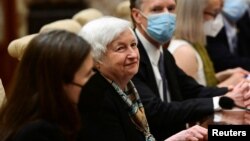U.S. Treasury Secretary Janet Yellen kicks off two days of talks with Chinese Vice Premier He Lifeng Thursday as the U.S. looks to manage tensions with Beijing and keep dialogue open on a range of issues from climate change to trade and defense.
Following Yellen’s meetings on Thursday and Friday, presidents Joe Biden and Xi Jinping are expected to meet next week on the sidelines of the Asia-Pacific Economic Cooperation, or APEC, forum in San Francisco.
Analysts say Yellen’s meeting with He is the latest attempt to ensure that China doesn’t back out of the upcoming meeting between the two heads of state. Yellen has previously emphasized a relationship based on “healthy competition” rather than mutual scorn.
In remarks to He ahead of the talks in San Francisco, Yellen said that “the United States has no intention to decouple from China …” but when concerns arise “about specific economic practices, such as those that prevent American firms and workers from competing on a level playing field, we will communicate them directly.”
He told Yellen through an interpreter that his meetings with her have been “constructive.” He also said that U.S.-China relations needed to be restored “back to a healthy and stable development.”
Maintaining lines of communication is how Yellen has so far advanced her diplomacy and prevented misunderstandings about U.S. foreign policy. In July, she visited Beijing to meet with He.
“This week, I will speak to my counterpart about our serious concerns with Beijing's unfair economic practices, including its large-scale use of non-market tools, its barriers to market access, and its coercive actions against U.S. firms in China,” Yellen wrote in an op-ed for The Washington Post that was published on Monday.
In that op-ed, Yellen also emphasized that global problems, including climate change and debt relief for developing nations, could provide opportunities for bilateral cooperation.
Some information for this report was provided by Reuters.






